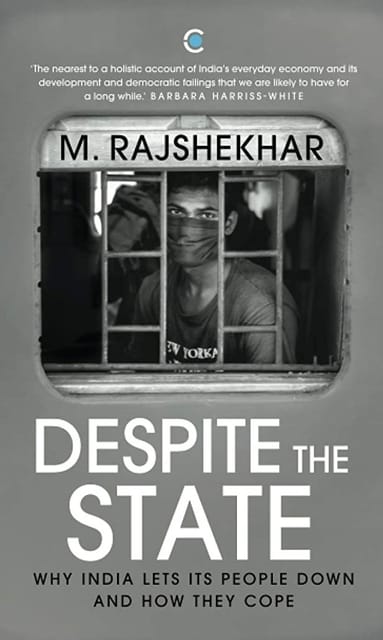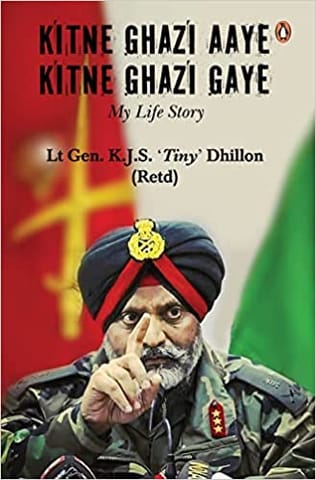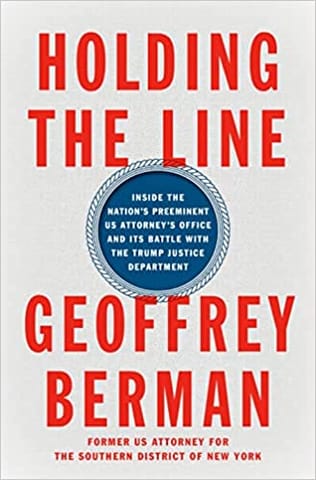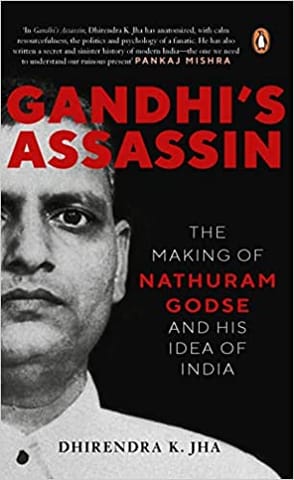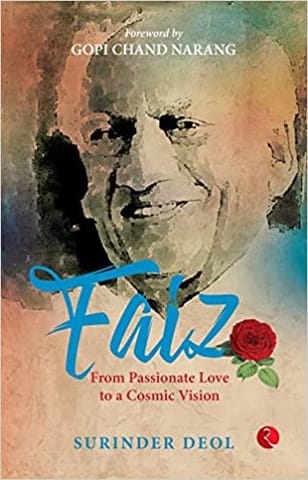- Non-ficton
- Non-ficton
- Contemporary Fiction
- Contemporary Fiction
- Children
- Children
- Comics & Graphic Novels
- Comics & Graphic Novels
- Non-Fiction
- Non-Fiction
- Fiction
- Fiction
The story of democratic failure is usually read at the level of the nation, while the primary bulwarks of democratic functioning—the states—get overlooked. This is a tale of India’s states, of why they build schools but do not staff them with teachers; favour a handful of companies so much that others slip into losses; wage water wars with their neighbours while allowing rampant sand mining and groundwater extraction; harness citizens’ right to vote but brutally crack down on their right to dissent. Reporting from six states over thirty-three months, award-winning investigative journalist M. Rajshekhar delivers a necessary account of a deep crisis that has gone largely unexamined.
Review
‘The nearest to a holistic account of India’s everyday economy and its development and democratic failings that we are likely to have for a long while.’
—Barbara Harriss-White, emeritus professor of Development Studies, University of Oxford, UK
‘Despite the State is, to use the author’s words, a hitchhiker’s guide to democratic palsy, lucid and informed by a unique perspective shaped by inquiries into everything from the human brain to political philosophy.’
—T.K. Arun, consulting editor, Economic Times
‘This is a frightening account of India's neglect of basic functions of governance and minimal democracy.’
—Tridip Suhrud, writer and translator, Ahmedabad
‘It is a book full of stories: of real people making the best of their potential, uncomplaining and leading their lives towards contentment, and so self-contained that they do not even notice that the State is absent. It is deeply insightful, and therefore deeply disturbing.’
—M.S. Sriram, IIM-Bangalore
‘Provocative, serious and humorous. An important book for our times.’
—Madhu Ramnath, botanist and author of Woodsmoke and Leafcups: Autobiographical Footnotes to the Anthropology of the Durwa People
‘Despite the State is a remarkable, involved, engaging narrative that captures the voices and lived experiences of people. It is not a pretty tale; but it does help us identify the fault lines in our politics and economy, and urges us to do something about it, now.’
—Usha Ramanathan, scholar on the jurisprudence of law and poverty
‘Can people cope with failures of the State? What emerges is a fascinating and very well-written quilted story of hope, anxiety and guile. Do read on.’
—Abhijit Sen, economist and former member of Planning Commission
"The picture that emerges is of a democracy that has been hijacked by vested interests, interested only in power and pelf."
-Moneycontrol.com
"What is unmistakable in this writing is an overwhelming love of India and compassion for its subjects, a passion for truth, and the hope that understanding why Indian governance and democracy is so spectacularly faulty will help us common people to fix them."
-Business Standard
"Refreshingly new writing on the play between India’s dysfunctional democracy and its development challenges... merges good investigative journalism with sharp academic analysis."
-Seminar
"The book... brings readers face to face with realities far removed from what is expected in or projected for a democracy."
-The Hindu
"Despite the State strives for an understanding of the factors that enable governments and political parties to function in a way that is seemingly hostile to the interests of the very public they have been elected to serve, a gross anomaly in an electoral democracy."
-Scroll.in
About the Author
M. Rajshekhar started his career as a business reporter in 1997. He began reporting on environmental issues as a freelance journalist in 2005. After a brief stint with the World Bank, an MA at the University of Sussex, and two years of independent research—spent studying the village-level impact of an agribusiness model in central India and the drafting process which produced India’s Forest Rights Act—he joined the Economic Times to report on rural India and environment in 2010. During this period, he won two Shriram Awards for Excellence in Financial Journalism (2013 and 2014).
He joined Scroll.in in 2015 to do a thirty-three-month-long reporting project, Ear to the Ground, which became the substrate for this book. This series won the Ramnath Goenka Excellence in Journalism Award (2015), the Bala Kailasam Memorial Award (2016), and two more Shriram Awards for Excellence in Financial Journalism (2015 and 2016).
He now writes on energy, environment, climate change, political corruption and oligarchy. His reportage can be found at www.mrajshekhar.in.
- Home
- Non-Fiction
- True Story
- Despite the State: Why India Lets Its People Down and How They Cope
Despite the State: Why India Lets Its People Down and How They Cope
SIZE GUIDE
Book Description
The story of democratic failure is usually read at the level of the nation, while the primary bulwarks of democratic functioning—the states—get overlooked. This is a tale of India’s states, of why they build schools but do not staff them with teachers; favour a handful of companies so much that others slip into losses; wage water wars with their neighbours while allowing rampant sand mining and groundwater extraction; harness citizens’ right to vote but brutally crack down on their right to dissent. Reporting from six states over thirty-three months, award-winning investigative journalist M. Rajshekhar delivers a necessary account of a deep crisis that has gone largely unexamined.
Review
‘The nearest to a holistic account of India’s everyday economy and its development and democratic failings that we are likely to have for a long while.’
—Barbara Harriss-White, emeritus professor of Development Studies, University of Oxford, UK
‘Despite the State is, to use the author’s words, a hitchhiker’s guide to democratic palsy, lucid and informed by a unique perspective shaped by inquiries into everything from the human brain to political philosophy.’
—T.K. Arun, consulting editor, Economic Times
‘This is a frightening account of India's neglect of basic functions of governance and minimal democracy.’
—Tridip Suhrud, writer and translator, Ahmedabad
‘It is a book full of stories: of real people making the best of their potential, uncomplaining and leading their lives towards contentment, and so self-contained that they do not even notice that the State is absent. It is deeply insightful, and therefore deeply disturbing.’
—M.S. Sriram, IIM-Bangalore
‘Provocative, serious and humorous. An important book for our times.’
—Madhu Ramnath, botanist and author of Woodsmoke and Leafcups: Autobiographical Footnotes to the Anthropology of the Durwa People
‘Despite the State is a remarkable, involved, engaging narrative that captures the voices and lived experiences of people. It is not a pretty tale; but it does help us identify the fault lines in our politics and economy, and urges us to do something about it, now.’
—Usha Ramanathan, scholar on the jurisprudence of law and poverty
‘Can people cope with failures of the State? What emerges is a fascinating and very well-written quilted story of hope, anxiety and guile. Do read on.’
—Abhijit Sen, economist and former member of Planning Commission
"The picture that emerges is of a democracy that has been hijacked by vested interests, interested only in power and pelf."
-Moneycontrol.com
"What is unmistakable in this writing is an overwhelming love of India and compassion for its subjects, a passion for truth, and the hope that understanding why Indian governance and democracy is so spectacularly faulty will help us common people to fix them."
-Business Standard
"Refreshingly new writing on the play between India’s dysfunctional democracy and its development challenges... merges good investigative journalism with sharp academic analysis."
-Seminar
"The book... brings readers face to face with realities far removed from what is expected in or projected for a democracy."
-The Hindu
"Despite the State strives for an understanding of the factors that enable governments and political parties to function in a way that is seemingly hostile to the interests of the very public they have been elected to serve, a gross anomaly in an electoral democracy."
-Scroll.in
About the Author
M. Rajshekhar started his career as a business reporter in 1997. He began reporting on environmental issues as a freelance journalist in 2005. After a brief stint with the World Bank, an MA at the University of Sussex, and two years of independent research—spent studying the village-level impact of an agribusiness model in central India and the drafting process which produced India’s Forest Rights Act—he joined the Economic Times to report on rural India and environment in 2010. During this period, he won two Shriram Awards for Excellence in Financial Journalism (2013 and 2014).
He joined Scroll.in in 2015 to do a thirty-three-month-long reporting project, Ear to the Ground, which became the substrate for this book. This series won the Ramnath Goenka Excellence in Journalism Award (2015), the Bala Kailasam Memorial Award (2016), and two more Shriram Awards for Excellence in Financial Journalism (2015 and 2016).
He now writes on energy, environment, climate change, political corruption and oligarchy. His reportage can be found at www.mrajshekhar.in.
User reviews
NEWSLETTER
Subscribe to get Email Updates!
Thanks for subscribing.
Your response has been recorded.

India's Iconic & Independent Book Store offering a vast selection of books across a variety of genres Since 1978.
"We Believe In The Power of Books" Our mission is to make books accessible to everyone, and to cultivate a culture of reading and learning. We strive to provide a wide range of books, from classic literature, sci-fi and fantasy, to graphic novels, biographies and self-help books, so that everyone can find something to read.
Whether you’re looking for your next great read, a gift for someone special, or just browsing, Midland is here to make your book-buying experience easy and enjoyable.
We are shipping pan India and across the world.
For Bulk Order / Corporate Gifting
 +91 9818282497 |
+91 9818282497 |  [email protected]
[email protected]
Click To Know More
QUICK LINKS
ADDRESS
Shop No.20, Aurobindo Palace Market, Near Church, New Delhi

